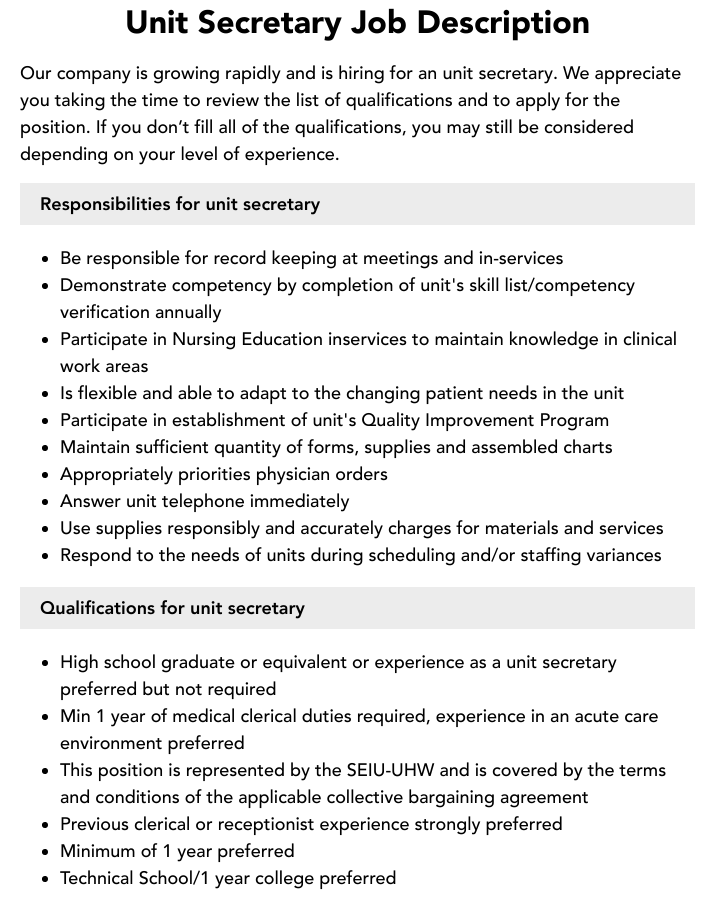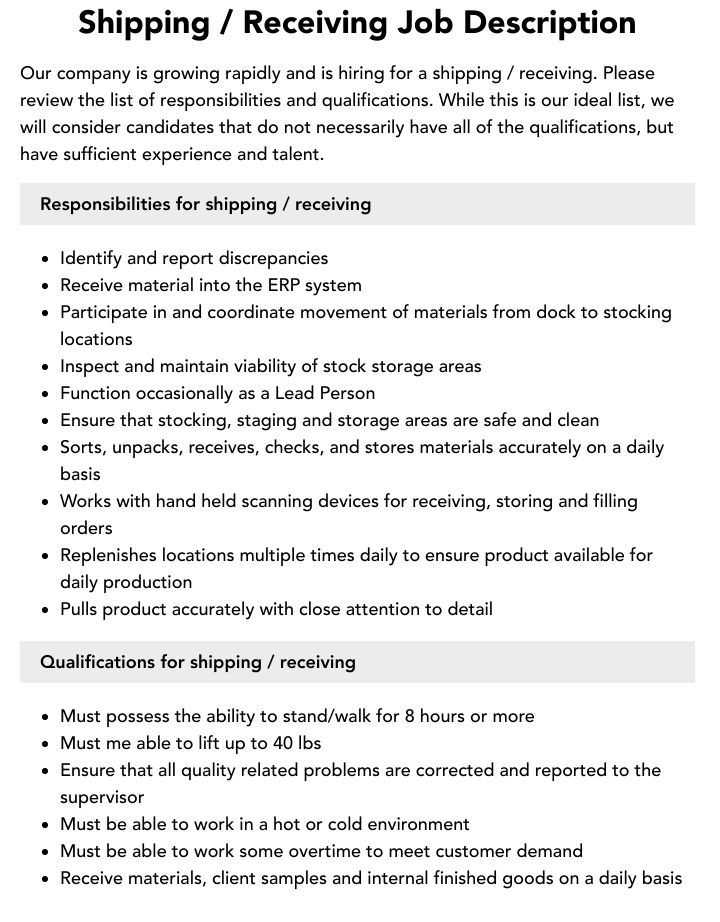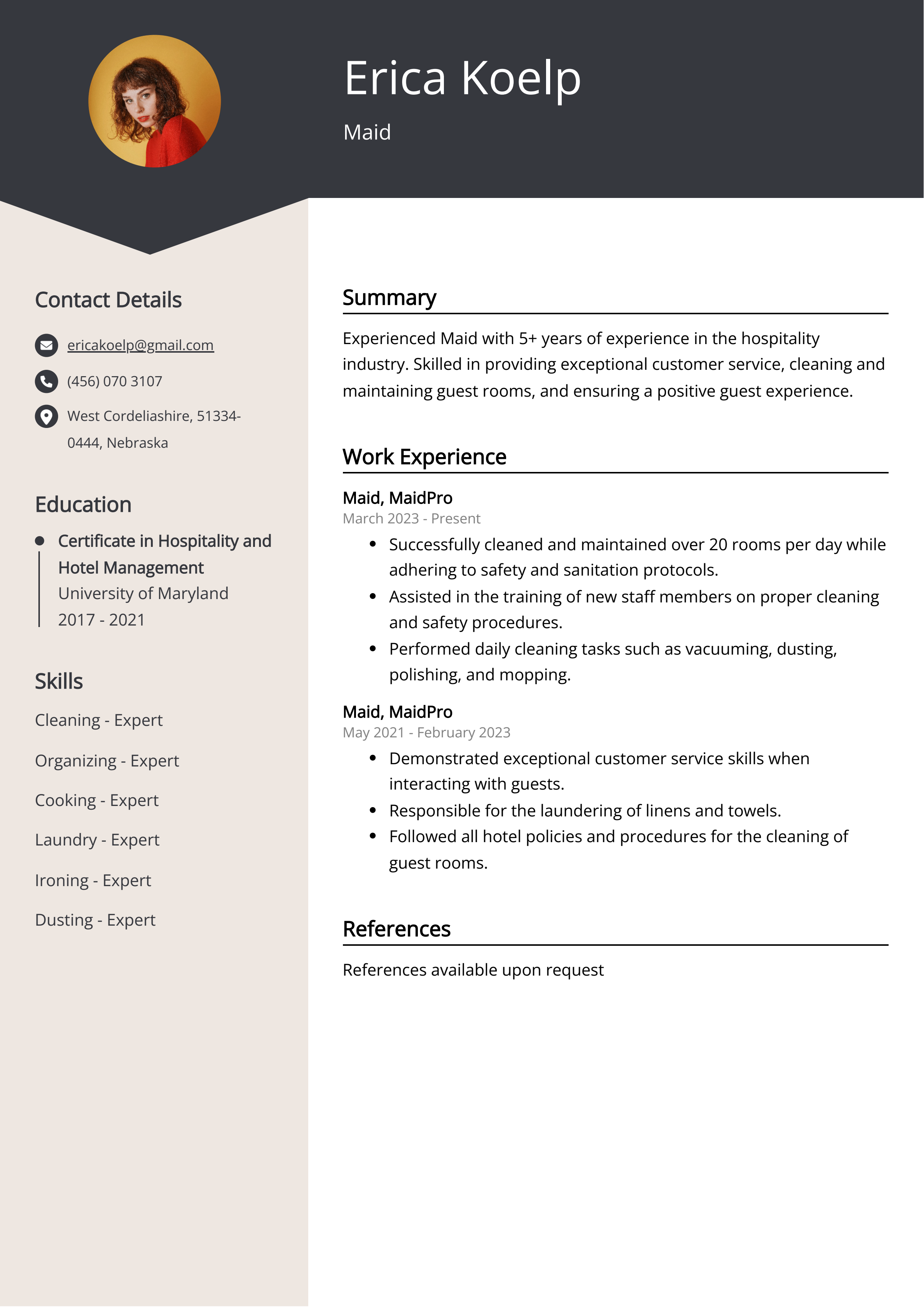
A unit secretary job description outlines the duties and responsibilities of a secretary working in a specific unit within an organization, typically a hospital or medical facility. The secretary provides administrative and clerical support to the unit, including tasks such as scheduling appointments, answering phones, managing patient records, and assisting with insurance and billing.
Unit secretaries play a vital role in ensuring the smooth operation of the unit. They are responsible for maintaining patient confidentiality, providing excellent customer service, and working effectively with other members of the healthcare team. The job description for a unit secretary should clearly outline the specific duties and responsibilities of the position, as well as the qualifications and experience required.
Here are some of the main topics that are typically included in a unit secretary job description:
- Duties and responsibilities
- Qualifications and experience
- Education and training
- Compensation and benefits
- Job outlook
1. Administrative tasks
Administrative tasks are an essential part of any unit secretary job description. These tasks help to ensure that the unit runs smoothly and efficiently. By performing these tasks accurately and efficiently, unit secretaries can help to improve the quality of care for patients.
Some of the most common administrative tasks that unit secretaries perform include:
- Scheduling appointments
- Answering phones
- Managing patient records
- Processing insurance claims
In addition to these tasks, unit secretaries may also be responsible for other duties, such as:
- Greeting patients and visitors
- Providing information about the unit
- Assisting with patient care
- Maintaining the unit’s supplies
Unit secretaries play a vital role in the healthcare team. They are responsible for ensuring that the unit runs smoothly and efficiently, and they provide valuable support to patients and their families.
2. Patient care
Unit secretaries play a vital role in providing patient care in a variety of ways, including assisting with patient intake and discharge, providing information to patients and their families, and helping to ensure that patients have a positive experience during their stay. These tasks are essential to the smooth operation of any healthcare unit, and unit secretaries play a key role in ensuring that patients receive the best possible care.
-
Assisting with patient intake and discharge
Unit secretaries are often the first point of contact for patients when they are admitted to a healthcare unit. They are responsible for registering patients, collecting their insurance information, and assigning them to a room. They also provide patients with information about the unit and answer any questions they may have. When patients are discharged from the unit, unit secretaries are responsible for processing their paperwork and providing them with instructions on how to follow up with their care. -
Providing information to patients and their families
Unit secretaries are a valuable source of information for patients and their families. They can provide information about the unit, the patient’s condition, and the patient’s treatment plan. They can also answer questions about the patient’s medications, diet, and activity level. Unit secretaries can also provide emotional support to patients and their families during a difficult time. -
Helping to ensure that patients have a positive experience during their stay
Unit secretaries can help to make patients’ stays more comfortable and less stressful. They can do this by providing a warm and welcoming environment, responding to patients’ needs promptly, and advocating for patients’ rights. Unit secretaries can also help to connect patients with resources and services that can help them during their stay.
The role of the unit secretary in patient care is essential to the smooth operation of any healthcare unit. By providing a variety of services to patients and their families, unit secretaries help to ensure that patients have a positive experience during their stay.
3. Communication
Effective communication is essential for unit secretaries. They must be able to communicate clearly and concisely with patients, family members, and other members of the healthcare team in order to provide the best possible care. Unit secretaries must also be able to listen attentively to patients and their families in order to understand their needs and concerns.
There are a number of reasons why communication is so important for unit secretaries. First, unit secretaries are often the first point of contact for patients and their families. They are responsible for greeting patients and their families, answering their questions, and providing them with information about the unit. Unit secretaries must be able to communicate clearly and concisely in order to ensure that patients and their families understand the information that they are being given.
Second, unit secretaries play a vital role in the care of patients. They are responsible for monitoring patients’ conditions, administering medications, and providing other care. Unit secretaries must be able to communicate effectively with other members of the healthcare team in order to ensure that patients are receiving the best possible care.
Third, unit secretaries are often the ones who provide emotional support to patients and their families. They can provide a listening ear, offer words of encouragement, and help patients and their families to cope with the challenges of illness. Unit secretaries must be able to communicate effectively in order to provide the best possible support to patients and their families.
In short, communication is essential for unit secretaries. They must be able to communicate clearly and concisely with patients, family members, and other members of the healthcare team in order to provide the best possible care. Unit secretaries must also be able to listen attentively to patients and their families in order to understand their needs and concerns.
4. Confidentiality
Confidentiality is an essential aspect of a unit secretary job description. Unit secretaries are responsible for handling sensitive patient information on a daily basis, so it is crucial that they are able to maintain confidentiality and protect patient privacy.
-
HIPAA compliance
The Health Insurance Portability and Accountability Act (HIPAA) is a federal law that protects the privacy of patients’ health information. Unit secretaries must be familiar with HIPAA regulations and be able to comply with them in order to protect patient privacy.For example, unit secretaries must be careful not to disclose patient information to unauthorized individuals. They must also be careful about how they store and transmit patient information. Unit secretaries must also be aware of their own limitations and know when to refer patients to other healthcare professionals for more specialized care.
-
Ethical obligations
In addition to HIPAA regulations, unit secretaries also have ethical obligations to protect patient privacy. Unit secretaries must respect the privacy of patients and treat their information with confidentiality. They must also be aware of the potential consequences of violating patient privacy.For example, if a unit secretary discloses patient information to an unauthorized individual, the patient could file a lawsuit against the unit secretary or the healthcare facility. The unit secretary could also lose their job or face other disciplinary action.
-
Professionalism
Maintaining confidentiality is a sign of professionalism. Unit secretaries who are able to maintain confidentiality are more likely to be respected by their colleagues and patients. They are also more likely to be successful in their careers.For example, unit secretaries who are able to maintain confidentiality are more likely to be promoted to higher-level positions. They are also more likely to be sought out by other healthcare facilities for employment.
Confidentiality is an essential aspect of a unit secretary job description. Unit secretaries must be able to maintain confidentiality and protect patient privacy in order to be successful in their careers.
5. Teamwork
Teamwork is an essential aspect of a unit secretary job description. Unit secretaries are part of a team of healthcare professionals who work together to provide care to patients. They must be able to work effectively with other members of the team, including doctors, nurses, and other support staff. Unit secretaries must also be able to contribute to the overall success of the unit by completing their tasks accurately and efficiently.
-
Collaboration
Unit secretaries must be able to collaborate with other members of the healthcare team to provide the best possible care to patients. This includes sharing information, working together to solve problems, and supporting each other’s work. -
Communication
Unit secretaries must be able to communicate effectively with other members of the healthcare team. This includes being able to clearly and concisely convey information, both verbally and in writing. -
Problem-solving
Unit secretaries must be able to solve problems that arise in the workplace. This includes being able to identify problems, develop solutions, and implement those solutions. -
Teamwork skills
Unit secretaries must have good teamwork skills. This includes being able to work well with others, share responsibilities, and contribute to the overall success of the team.
Teamwork is essential for the success of any healthcare unit. Unit secretaries play a vital role in the team by providing administrative support and assisting with patient care. By working together effectively, the healthcare team can provide the best possible care to patients.
FAQs on Unit Secretary Job Description
This section provides answers to frequently asked questions about unit secretary job descriptions. These questions and answers aim to clarify common misconceptions and provide a better understanding of the role and responsibilities of a unit secretary.
Question 1: What are the primary duties and responsibilities of a unit secretary?
Unit secretaries perform various administrative and clerical tasks to support the smooth operation of a healthcare unit. Their responsibilities include scheduling appointments, answering phones, managing patient records, and processing insurance claims. They may also assist with patient care, such as providing information and emotional support to patients and their families.
Question 2: What qualifications are typically required for a unit secretary position?
Typically, unit secretaries need a high school diploma or equivalent and relevant experience in an office or healthcare setting. Some employers may prefer candidates with certification in medical office administration or a related field. Excellent communication, interpersonal, and organizational skills are essential for this role.
Question 3: What is the importance of confidentiality in a unit secretary’s role?
Maintaining confidentiality is paramount for unit secretaries. They handle sensitive patient information daily and must adhere to HIPAA regulations and ethical guidelines. Protecting patient privacy and respecting their rights are crucial aspects of their job.
Question 4: How does teamwork contribute to the success of a unit secretary?
Unit secretaries are part of a healthcare team and collaborate closely with doctors, nurses, and other support staff. Effective communication, problem-solving, and a willingness to contribute to the team’s goals are essential for the smooth functioning of the unit and the provision of quality patient care.
Question 5: What are the advancement opportunities for unit secretaries?
With experience and additional training or education, unit secretaries may advance to roles such as medical office manager, patient care coordinator, or other supervisory positions within the healthcare field.
Question 6: What is the job outlook for unit secretaries?
The job outlook for unit secretaries is expected to grow in the coming years due to the increasing demand for healthcare services and the aging population. The need for skilled and compassionate individuals to support healthcare teams will continue to drive job opportunities in this field.
These FAQs provide a comprehensive overview of the unit secretary job description and its key aspects. Understanding these details can help candidates prepare for and excel in this essential healthcare role.
Transition to the next article section: Understanding the unit secretary job description is crucial for both candidates and employers. It sets clear expectations, ensures a smooth hiring process, and contributes to the overall success of the healthcare unit.
Tips for Writing a Unit Secretary Job Description
Creating a clear and comprehensive job description is essential for attracting qualified candidates and ensuring the successful hiring of a unit secretary. Here are several tips to consider when writing a unit secretary job description:
Tip 1: Define the Unit Secretary’s Role
Clearly outline the primary duties and responsibilities of the unit secretary, including administrative tasks, patient care involvement, communication requirements, confidentiality protocols, and teamwork expectations.
Tip 2: Specify Qualifications and Experience
Indicate the minimum qualifications and experience required for the position, such as a high school diploma or equivalent, relevant office or healthcare experience, and any preferred certifications or licenses.
Tip 3: Emphasize Communication and Interpersonal Skills
Highlight the importance of excellent communication, both verbal and written, as well as strong interpersonal skills for effectively interacting with patients, families, and healthcare professionals.
Tip 4: Outline Confidentiality and Ethical Obligations
Clearly state the unit secretary’s responsibilities in maintaining patient confidentiality and adhering to ethical guidelines, ensuring compliance with HIPAA regulations and protecting patient privacy.
Tip 5: Include Teamwork and Collaboration Expectations
Emphasize the importance of teamwork and collaboration within the healthcare unit, outlining the unit secretary’s role in supporting other healthcare professionals and contributing to the overall success of the team.
Tip 6: Proofread Carefully
Before finalizing the job description, carefully proofread it for any errors in grammar, spelling, or formatting. A well-written and error-free job description reflects the professionalism and credibility of the healthcare organization.
Following these tips can help you create an effective unit secretary job description that attracts qualified candidates and provides a clear understanding of the position’s expectations and responsibilities.
Conclusion
A well-written unit secretary job description is essential for ensuring a successful hiring process and attracting qualified candidates who can effectively support the healthcare team and provide excellent patient care.



